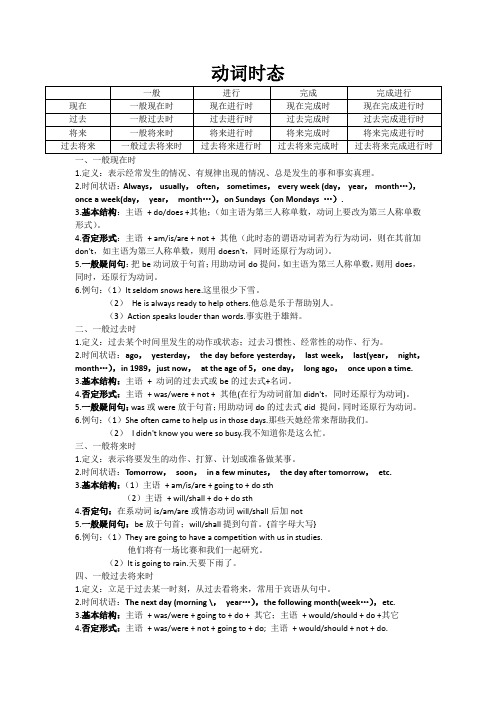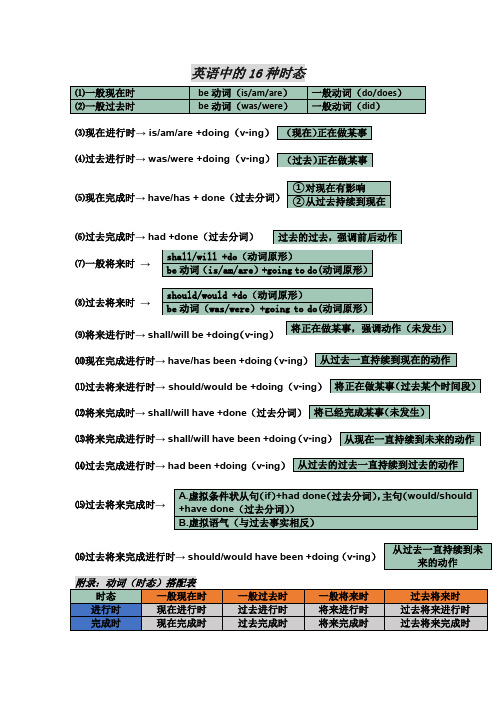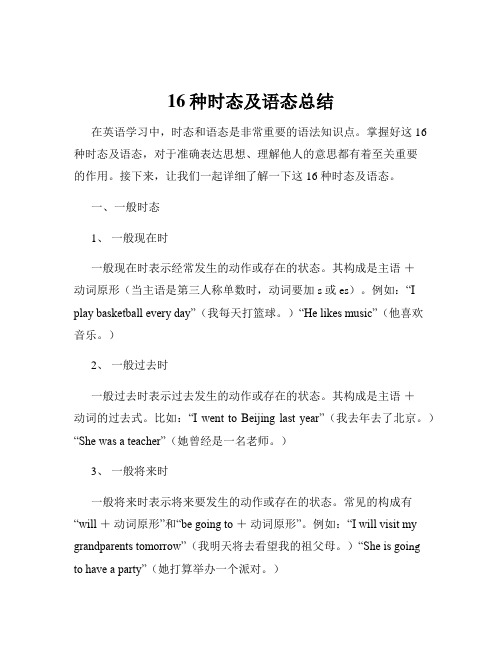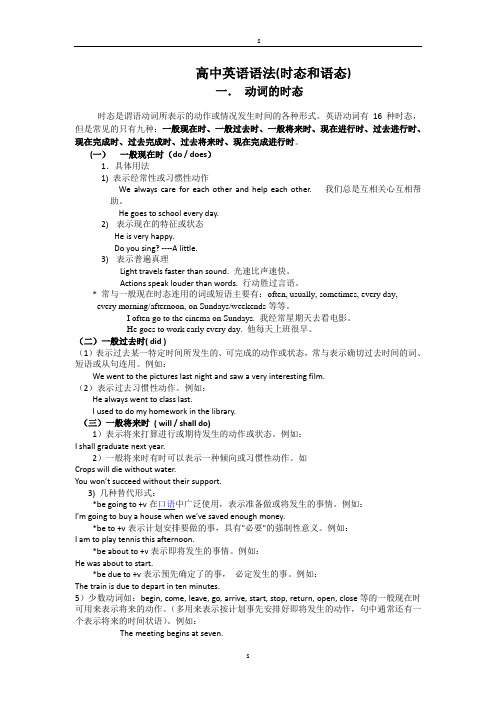时态和语态
英语语法(时态、语态)

动词时态一、一般现在时1.定义:表示经常发生的情况、有规律出现的情况、总是发生的事和事实真理。
2.时间状语:Always,usually,often,sometimes,every week (day,year,month…),once a week(day,year,month…),on Sundays(on Mondays …).3.基本结构:主语+ do/does +其他;(如主语为第三人称单数,动词上要改为第三人称单数形式)。
4.否定形式:主语+ am/is/are + not + 其他(此时态的谓语动词若为行为动词,则在其前加don't,如主语为第三人称单数,则用doesn't,同时还原行为动词)。
5.一般疑问句:把be动词放于句首;用助动词do提问,如主语为第三人称单数,则用does,同时,还原行为动词。
6.例句:(1)It seldom snows here.这里很少下雪。
(2)He is always ready to help others.他总是乐于帮助别人。
(3)Action speaks louder than words.事实胜于雄辩。
二、一般过去时1.定义:过去某个时间里发生的动作或状态;过去习惯性、经常性的动作、行为。
2.时间状语:ago,yesterday,the day before yesterday,last week,last(year,night,month…),in 1989,just now,at the age of 5,one day,long ago,once upon a time.3.基本结构:主语+ 动词的过去式或be的过去式+名词。
4.否定形式:主语+ was/were + not + 其他(在行为动词前加didn't,同时还原行为动词)。
5.一般疑问句:was或were放于句首;用助动词do的过去式did 提问,同时还原行为动词。
英语中的时态与语态-精讲

英语中的16种时态⑶现在进行时→ is/am/are +doing (v-ing )⑷过去进行时→ was/were +doing (v-ing )⑸现在完成时→ have/has + done (过去分词)⑹过去完成时→ had +done (过去分词)⑺一般将来时 →⑻过去将来时 →⑼将来进行时→ shall/will be +doing (v-ing )⑽现在完成进行时→ have/has been +doing (v-ing )⑾过去将来进行时→ should/would be +doing (v-ing )⑿将来完成时→shall/will have +done (过去分词)⒀将来完成进行时→ shall/will have been +doing (v-ing )⒁过去完成进行时→had been +doing (v-ing ) ⒂过去将来完成时→⒃过去将来完成进行时→ should/would have been +doing (v-ing )16种时态中的被动语态主动:A + 一般动词(do )+ B被动:B + be done (过去分词)+ by Aeg. You play basketball.⑴一般现在时:The by you.→⑵一般过去时:→⑶现在进行时:The by you.→⑷过去进行时:The by you.→⑸现在完成时:The by you.→⑹过去完成时:The by you.→⑺一般将来时:The by you.→⑻过去将来时:The by you.→⑼将来进行时:The by you.→⑽现在完成进行时:The by you.→⑾过去将来进行时:Theby⑿将来完成时:The by you.→⒀将来完成进行时:Theby you.→⒁过去完成进行时:The by you.→⒂过去将来完成时:The by you.→⒃过去将来完成进行时:Theby you.注:红体字部分为常用时态的被动形式附录:动词(被动形式)搭配表。
(完整版)高中语法之常用时态语态详解

第四章时态和语态一.动词的时态英语时态用共有十六种时态,其中常用的有8种,它们是:一般现在时、一般过去时、一般将来时、现在进行时、现在完成时、过去进行时、过去完成时和过去将来时。
一. 一般现在时.1.构成. be动词:am is are ; 其他动词用动词原形,当主语是第三人称单数时要在谓语动词后加“s”,其变化规则与名词变复数一致。
2.用法. 1). 经常性或习惯性的动作,常与表示频度的时间状语连用。
如usually, always, often, seldom, never, every...,eg. I leave home for school at 7 every morning.I don’t leave home for school at 7 every morning.Do I leave home for school at 7 every morning?He usually gets up early.He doesn’t usually get up early.Does he usually get up early?2) 客观真理,客观存在,科学事实。
eg. The earth moves around the sun.The earth doesn’t move around the sun 否定句Does the earth move around the sun? 疑问句Shanghai lies in the east of China.Shanghai doesn’t lie in the east of China 否定句Does Shanghai lie in the east of China? 疑问句Water boils at 100 centigrade degrees.3) 表示格言或警句中eg. Pride goes before a fall.注意. 此用法如果出现在宾语从句中,即使主句是过去时,从句谓语也要用一般现在时。
16种时态及语态总结

16种时态及语态总结在英语学习中,时态和语态是非常重要的语法知识点。
掌握好这 16 种时态及语态,对于准确表达思想、理解他人的意思都有着至关重要的作用。
接下来,让我们一起详细了解一下这 16 种时态及语态。
一、一般时态1、一般现在时一般现在时表示经常发生的动作或存在的状态。
其构成是主语+动词原形(当主语是第三人称单数时,动词要加 s 或 es)。
例如:“I play basketball every day”(我每天打篮球。
)“He likes music”(他喜欢音乐。
)2、一般过去时一般过去时表示过去发生的动作或存在的状态。
其构成是主语+动词的过去式。
比如:“I went to Beijing last year”(我去年去了北京。
)“She was a teacher”(她曾经是一名老师。
)3、一般将来时一般将来时表示将来要发生的动作或存在的状态。
常见的构成有“will +动词原形”和“be going to +动词原形”。
例如:“I will visit my grandparents tomorrow”(我明天将去看望我的祖父母。
)“She is goi ngto have a party”(她打算举办一个派对。
)二、进行时态1、现在进行时现在进行时表示现在正在进行的动作。
其构成是“be(am/is/are)+现在分词”。
例如:“I am reading a book now”(我现在正在读书。
)2、过去进行时过去进行时表示过去某个时刻正在进行的动作。
其构成是“was/were +现在分词”。
比如:“He was playing football at this time yesterday”(昨天这个时候他正在踢足球。
)3、将来进行时将来进行时表示将来某个时刻正在进行的动作。
其构成是“will be +现在分词”。
例如:“I will be studying English at 8 o'clock tomorrow evening”(明天晚上 8 点我将正在学习英语。
英语八种时态及语态

英语八种时态及语态一.现在进行时态(正在进行)1.结构:Be + V- ing . 被动语态结构am/is /are + being+ p.p2.关键词;look , listen , now, at the moment , at presente. g The students ----------( play ) at five o’clock in the afternoon.二.一般现在时态(经常性,反复性)1.结构 A. be型am/ is are + n / adj/ prep phrase被动语态结构am/is/are +p.pe. g I am a student . / He is tired . / They are at home.一般疑问句将be 提前,否定句在be 后加not.B.行为动词:1). S+ V (主语除第三人称单数)e. g We study English. / Do you study English ? / We don’t study English. 一般疑问句加助动词do ,否定句加助动词don’t.They do their homework. / Do they do their homework ? / They don’t do their homework.2). S + V(单三)。
主语是第三人称(he, she, your mother, lily); 动词第三人称变化相当于名词变复数。
E. g His brother studies hard every day. /Does his brother study hard every day ?His brother doesn’t study hard every day.一般疑问句在加Does, 否定句加doesn’t. 后要还原动词原形。
e. g Her sister does some cooking in the evening. / Does her sister do some cooking in theevening .? Her sister doesn’t do some cooking in the evening.3. 关键词:every day ( week / month / year) / in the morning ( afternoon / evening)On Monday (s) at weekend (s)Always /often / usually /sometimes= at times. Once a week (how often)三.一般过去时态(过去的动作,状态)1.结构。
英语中的时态和语态

英语中的时态和语态时态和语态是英语语法中非常重要的概念。
掌握时态和语态对于正确理解和运用英语语言至关重要。
本文将深入探讨英语中的时态和语态,帮助读者更好地掌握这两个概念。
一、时态时态是表示动作或状态发生的时间的一种语法形式。
英语中有12种基本时态,分为三个时态组:一般时态、进行时态和完成时态。
1. 一般时态一般时态用于表示习惯性、经常性或普遍性的动作或状态。
它包括简单现在时、简单过去时和简单将来时。
- 简单现在时:表示现在的状态或经常性的动作。
例如:“I eat breakfast every morning.”(我每天早上吃早餐。
)- 简单过去时:表示过去发生的动作或状态。
例如:“She studied English last night.”(她昨晚学习了英语。
)- 简单将来时:表示将来发生的动作或状态。
例如:“They will go to the beach tomorrow.”(他们明天将去海滩。
)2. 进行时态进行时态用于表示正在进行的动作。
它包括现在进行时、过去进行时和将来进行时。
- 现在进行时:表示现在正在进行的动作。
例如:“I am reading a book ri ght now.”(我正在读一本书。
)- 过去进行时:表示过去某一时间点正在进行的动作。
例如:“She was cooking dinner at 6 o'clock yesterday.”(昨天6点她正在做晚饭。
)- 将来进行时:表示将来某一时间点正在进行的动作。
例如:“They will be watching a movie at this time tomorrow.”(明天此时他们将在看电影。
)3. 完成时态完成时态用于表示已经完成的动作。
它包括现在完成时、过去完成时和将来完成时。
- 现在完成时:表示过去某一时间点发生的动作对现在造成的影响。
例如:“I have finished my homework.”(我已经完成了作业。
英语的时态与语态

英语的时态与语态时态和语态是英语语法中非常重要的概念,它们对于正确表达和理解英语句子起着至关重要的作用。
在本文中,我们将探讨英语的时态与语态,深入了解它们的用法和区别。
一、时态时态是用来表示动作或状态发生的时间的一种语法形式。
在英语中,一般有过去时、现在时和将来时三种基本时态。
1. 过去时过去时用来表示过去发生的动作或状态。
一般过去时的构成是在动词原形后加上-ed,例如:walked, talked。
但也有一些不规则动词需要特殊记忆,例如:went, saw。
例句:- I walked to the store yesterday.(昨天我走到了商店。
)- She ate lunch an hour ago.(她一个小时前吃了午饭。
)2. 现在时现在时用来表示现在正在进行的动作或状态。
一般现在时的构成是动词原形,但第三人称单数要在动词后加上-s或-es。
例句:- I am reading a book now.(我现在正在看书。
)- He teaches English at the university.(他在大学教英语。
)3. 将来时将来时用来表示将来发生的动作或状态。
一般将来时的构成是在助动词will后加上动词原形。
例句:- I will go to the party tomorrow.(明天我将去参加派对。
)- They will arrive at the airport in two hours.(他们将在两小时后到达机场。
)二、语态语态是用来表示句子的主语和谓语之间的关系的一种语法形式。
在英语中,一般有主动语态和被动语态两种基本语态。
1. 主动语态主动语态表示主语是动作的执行者。
例句:- She wrote a letter.(她写了一封信。
)- He is washing the car.(他正在洗车。
)2. 被动语态被动语态表示主语是动作的承受者。
例句:- The letter was written by her.(这封信是她写的。
(完整)高中英语语法(时态和语态)

高中英语语法(时态和语态)一.动词的时态时态是谓语动词所表示的动作或情况发生时间的各种形式。
英语动词有16种时态,但是常见的只有九种:一般现在时、一般过去时、一般将来时、现在进行时、过去进行时、现在完成时、过去完成时、过去将来时、现在完成进行时。
(一)一般现在时(do / does)1.具体用法1) 表示经常性或习惯性动作We always care for each other and help each other. 我们总是互相关心互相帮助。
He goes to school every day.2)表示现在的特征或状态He is very happy.Do you sing? ----A little.3)表示普遍真理Light travels faster than sound. 光速比声速快。
Actions speak louder than words. 行动胜过言语。
* 常与一般现在时态连用的词或短语主要有:often, usually, sometimes, every day,every morning/afternoon, on Sundays/weekends等等。
I often go to the cinema on Sundays. 我经常星期天去看电影。
He goes to work early every day. 他每天上班很早。
(二)一般过去时( did )(1)表示过去某一特定时间所发生的、可完成的动作或状态,常与表示确切过去时间的词、短语或从句连用。
例如:We went to the pictures last night and saw a very interesting film.(2)表示过去习惯性动作。
例如:He always went to class last.I used to do my homework in the library.(三)一般将来时( will / shall do)1)表示将来打算进行或期待发生的动作或状态。
- 1、下载文档前请自行甄别文档内容的完整性,平台不提供额外的编辑、内容补充、找答案等附加服务。
- 2、"仅部分预览"的文档,不可在线预览部分如存在完整性等问题,可反馈申请退款(可完整预览的文档不适用该条件!)。
- 3、如文档侵犯您的权益,请联系客服反馈,我们会尽快为您处理(人工客服工作时间:9:00-18:30)。
时态和语态
【时态】英语中表示不同时间发生的动作或存在的状态,需用不同的动词形式表示,这种不同的动词形式称为时态。
常见时态及用法:
1.一般现在时:表示现在状态和特点;表示经常或习惯性的动作、状态;表示客观现实和真理(do/does)
2.一般过去时:在过去某个时间里所发生的动作或存在的状态(did)
3.一般将来时:在将来某一时刻要发生的动作或存在的状态(will/shall do)
4.过去将来时:在过去某一时刻看来将要发生的动作或存在的状态(would do)
5.现在进行时:表示现在或现阶段正在发生的动作(am/is/are doing)
6.过去进行时:表示在过去某一时刻或某一阶段正在进行的动作(was/were doing)
7.将来进行时:表示将来某一时刻或某一阶段正在进行的动作(will/shall be doing)
8.现在完成时:表示过去已发生或完成的动作或状态,其结果影响到现在;也表示过去开始并持续到现在的动作或状态
(have/has done)
9.过去完成时:表示在过去某一时间或动作之前已经发生或完成的动作,即“过去的过去”(had done)
10.现在完成进行时:表示一个动作从过去就开始一直延续到现在并有可能继续下去(have/has been doing)
【语态】语态有两种:主动语态和被动语态。
主语是动作的发出者为主动语态;主语是动作的接受者为被动语态。
被
动语态由“be+过去分词”构成,不同时态的被动语态的形式由be来体现
巩固练习1
1. I wonder why Jenny _____us recently. We should have heard from her by now.
A. hasn’t written
B. doesn’t write
C. won’t write
D. hadn’t written
2. — When will you come to see me,Dad? —I will go to see you when you ___ the training course.
A. will have finished
B. will finish
C. are finishing
D. finish
3.You can’t move in right now. The house _____. A. has painted B. is painted C. is being painted D. is painting
4.I don’t think Jim saw me,he ________ into space.
A. just stared
B. was just staring
C. has just stared
D. had just stared
5. His eyes shone brightly when he finally received the magazines he ________.
A. had long been expected
B. had long expected
C. has long expected
D. was long expected
6. My uncle said that he would telephone but I ________ from him so far.
A. didn’t hear
B. hadn’t heard
C.haven’t heard
D. won’t hear
7. ——Your phone number again? I _____ quite catch it. ————It’s 9568442.
A. didn’t
B. couldn’t
C. don’t
D. can’t
巩固练习2 用所给动词的适当形式填空
1. The house belongs to my aunt but she ___________________(not live) here any more.
2. This machine _____________________(not work). It has n’t worked for years.
3. If their marketing plans succeed, they______________________(increase) their sales by 20 percent.
4. Population experts predict that most people _____________(live) in cities in the near future.
5. He _____________(play) football regularly for many years when he was young.
6. -- Have you known Dr. Jackson for a long time?
-- Yes, since she __________________(join) the Chinese Society.
7. Teenagers _______________(damage) their health because they play computer games too much.
8. I called Tom many times last night, but I couldn’t get through. Her brother ______________ (talk) on the phone all the time!
9. John promised his doctor he ___________________ (not smoke), and he has never smoked ever since.
10.This time tomorrow, I__________________ (lie) on the beach
11. So far this year we ___________ (see) a fall in house prices by between 5 and 10 percent.
12. The hotel wasn’t particularly good. But I ____________ (stay) in many worse hotels.
13. We first met on a train in 2000. We both felt immediately that we ____________ (know) each other for years.
14. -- I’m sure Andrew will win the first prize in the final.
-- I think so. He _____________________ (prepare) for it for months.
15. --Did you go to the show last night?
--Yeah. Every boy and girl in the area _______________(invite).
16. -- What’s that noise?-- Oh, I forgot to tell you. The new machine_______________ (test).
17. I like these English songs and they ___________________ (teach) many times on the radio.。
